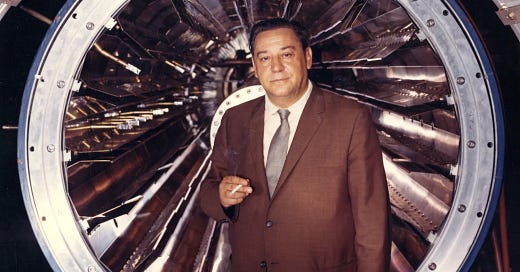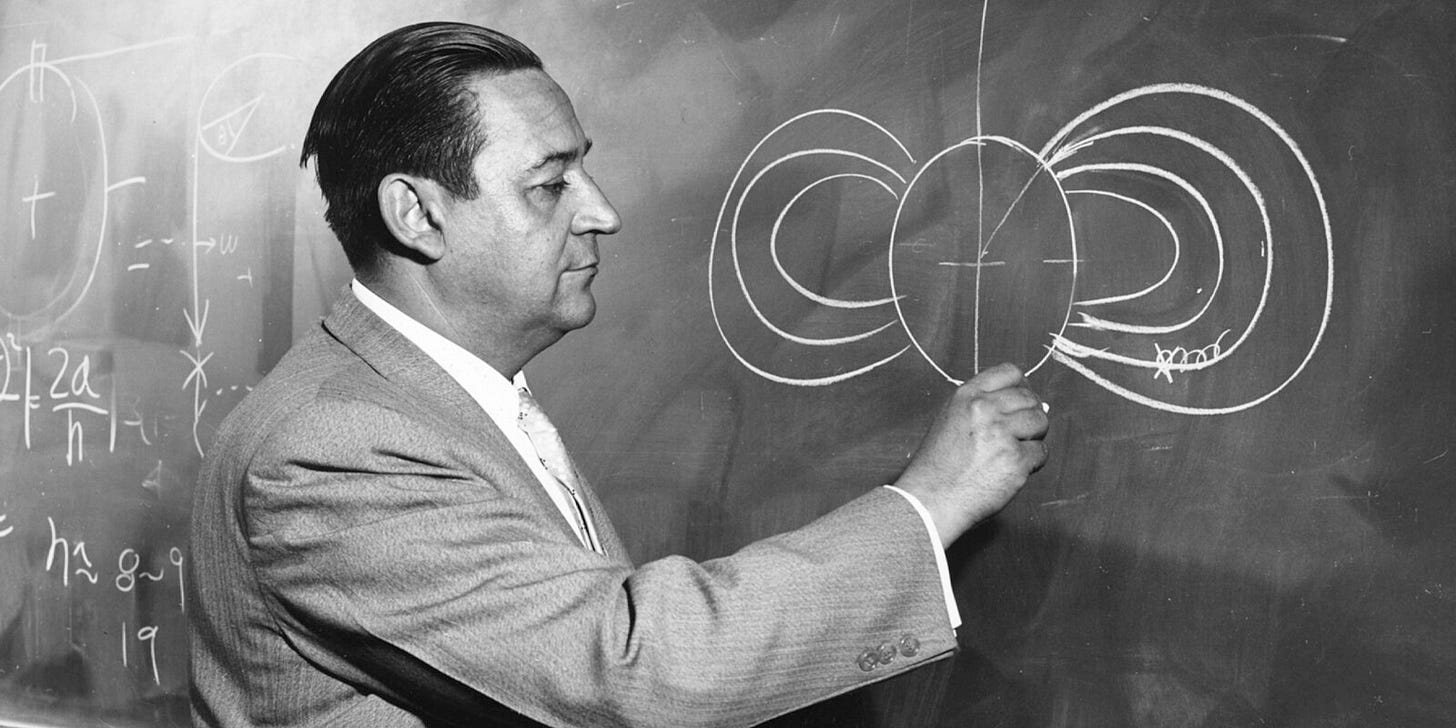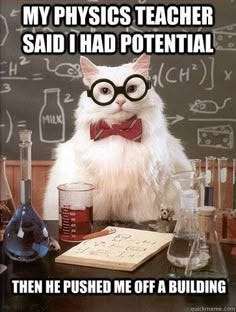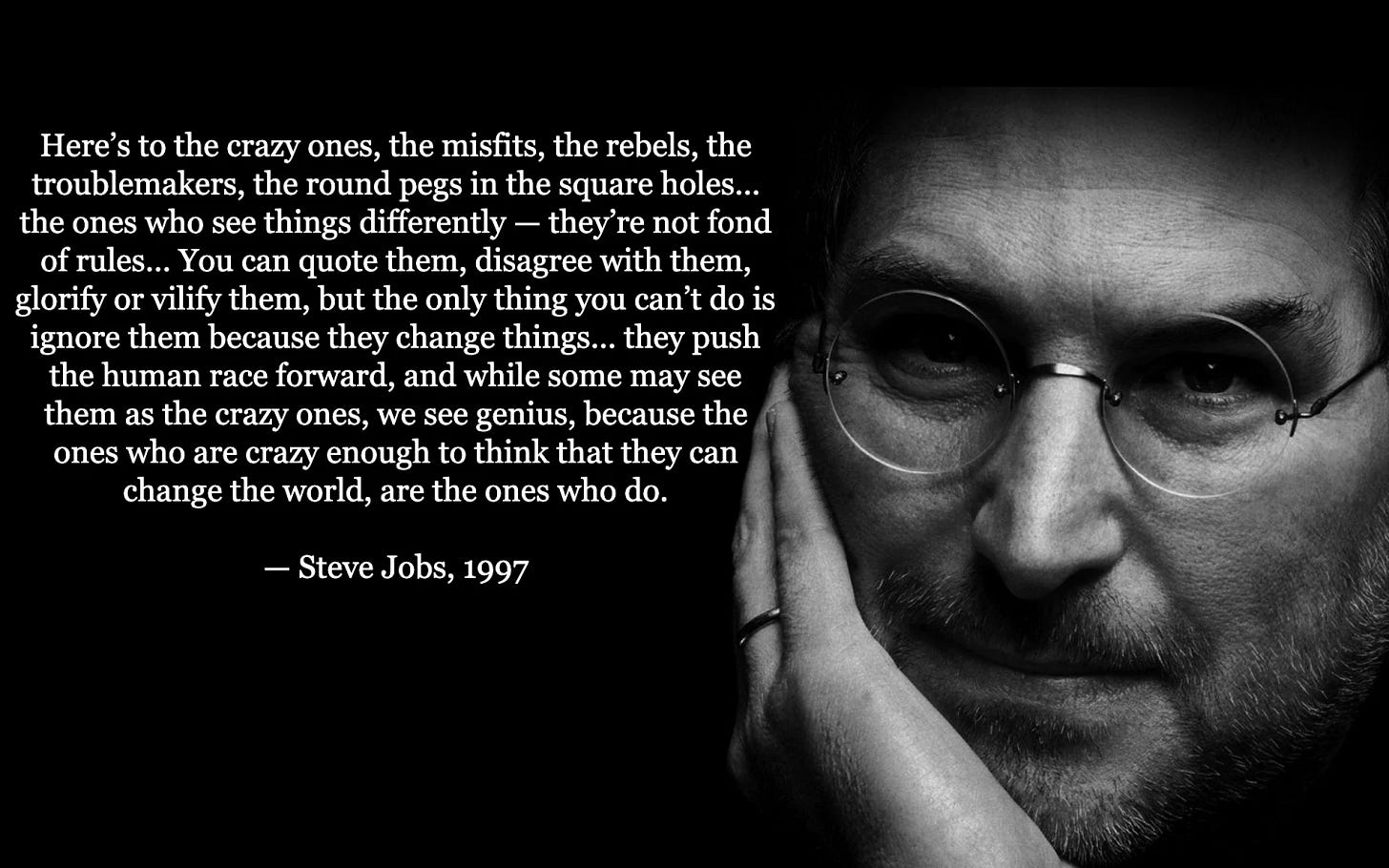A new Christofilos Effect
Who was Christofilos? What was his Effect? And why do we need a new one?
Welcome to the 36 awesome new readers who joined us in the past two weeks!
If you haven’t subscribed, join 3,824 smart, curious people interested in Changing Greece.
⚛ A new Christofilos Effect
Who was Christofilos? What was his Effect? And why do we need a new one?
All very valid questions for 99.9% of the people who read this newsletter.
Keep reading and I promise you will understand. Or so I hope.
Nicholas Christofilos — the “Crazy Greek”
Nicholas Christofilos is the greatest Greek physicist you probably never heard of.

According to the amazingly titled blog “Greatest Greeks”:
“Nicholas Christofilos was an autodidact physicist, a pioneer in the field of accelerator and nuclear physics, who first conceived the strong-focusing principle. The “Crazy Greek” as he was nicknamed by the press, went on to have a highly prestigious career in the United States and his name today is connected with one of the largest space experiments ever conducted on Earth, Operation Argus.”
Source: Greatest Greeks (2017)
Christofilos was born in Boston (USA) but raised in Athens (Greece). He attended the National Technical University of Athens and graduated with a degree in Electrical and Mechanical Engineering. During World War II, he worked for an elevator maintenance company in Athens, before creating his own.
The story would have probably ended around here if Christofilos did not possess a deep amateur passion about physics and spent his spare time learning more about fundamental particles. It was this passion (and apparently his ample free time maintaining elevators in Greece) that allowed him to develop his theory on strong focusing, the prelude to the famous “Christofilos Effect”.

Because he did not publish his discovery in any official physics journal, even though it was patented, his discovery went unnoticed for years. During that time, another group of famous physicists (Courant, Livingston and Snyder) independently made a similar discovery.
The story of Christofilos finding out he was not alone is pretty amazing:
“In 1953 Nick Christofilos visited the U.S. and while reading the Physical Review at the Brooklyn Public Library came upon the Courant, Livingston and Snyder article. He thought that his idea had been used without acknowledgement and rushed to Brookhaven where he was shown around by John Blewett. After some excited discussion it became clear that Christofilos deserved the credit for the earliest enunciation of the principle of strong focussing but also that the Brookhaven discovery was completely independent.
Source: Nicholas C. Christofilos: His Contributions to Physics (Melissinos 1993)
What makes the discovery by Christofilos even crazier is that it happened with little formal knowledge, limited contact with others and almost no access to the top literature in physics at the time. All he had was his perseverance.
Eventually, Christofilos was offered a position to the Brookhaven National Laboratory and his patented research was then used by the U.S. Atomic Energy Commission in various particle accelerators (then under construction).
Nicholas Christofilos led a prestigious scientific career, making groundbreaking discoveries in physics and leading some of the craziest experiments of all time (more on that in a bit). Some of his top achievements include: the Christofilos Effect, the invention of the Linear Induction Accelerator, research in thermonuclear fusion and applications of physics in defense and security.
Christofilos was also nominated for a Nobel Prize in Physics in 1971.
In the words of famed American scientist Herbert York:
“Nick was a remarkable idea man. The ideas were usually not good, but they were really remarkable in that they were the kind of ideas that nobody else had. Nick really was a genius in a very important sense -he often invented things that required two new ideas simultaneously, which is something that normally hardly anybody ever does.”
The “Christofilos Effect” — what was it?
The “Christofilos Effect” refers to the entrapment of electrons from nuclear weapons in the Earth's magnetic field.
I will kid neither myself nor my beloved readers by pretending I can explain strange scientific phenomena better than Wikipedia’s amazing pool of crowdsourced experts. If you want a full scientific explanation, you can read this beautifully explanatory article.
What I can tell you more about is where his theory was used: Operation Argus.
Operation Argus was a series of U.S. low-yield, high-altitude nuclear weapons and missile tests secretly conducted over the South Atlantic Ocean by the Defense Nuclear Agency almost 70 years ago.
“In late summer of 1958, the United States Navy Task Force 88 (TF 88) conducted one of the U.S.’s most expeditiously planned and executed nuclear tests operations, codenamed ARGUS, when it conducted three high-altitude nuclear tests in the south Atlantic Ocean. […] When the Eisenhower Administration subsequently released the occurrence of these tests to the public in the spring of 1959, it was hailed as the “greatest scientific experiment ever conducted.
[…] The Argus nuclear tests grew out an idea conceived of by Lawrence Livermore physicist Nicholas Christofilos.
[…] More than 40 ground stations throughout the world tracked and/or monitored telemetry of Explorer IV. The combined data from Explorer IV, the sounding rockets, and from surface stations all confirmed the presence of the effects predicted by Nicholas Christofilos.”
Many decades later, Operation Argus has left a very interesting legacy.



We are all still here, so nothing to be scared of.
Why do we need new “Christofilos Effects”?
Some people argue against the casual polymath model. But I beg to differ.
How did an autodidact that started working for an elevator maintenance company in Athens during the German occupation end up becoming a pioneer in the field of accelerator and nuclear physics?
I don’t know for sure, but I have a hunch.
High level of multidisciplinarity. Endless curiosity. And a dose of craziness.
Christofilos transcended disciplines. By training in classical music at a very young age, he was inspired to look for patterns everywhere. By studying Mechanical and Electrical Engineering, he understood at a much deeper level the application of many physical concepts that he learned in his spare time. And by marrying theory and practice, he was able to see a fuller picture that many of us often desperately lack.
Christofilos was also curious by nature. Apparently, as a child he would spend his time inventing improvised radio transmitters. As he grew older, the way he taught himself physics was by devouring any foreign (usually American or German) book he could find at some obscure Athenian corner.
And yes, he was a bit crazy too. But just the right amount to become a scientific pioneer, come up with a revolutionary (at the time) theory and also dabble in some of the wildest nuclear physics experiments of all time.
Why are these traits important?
Because change does not come from many of us conformists.
You probably know this very famous Steve Jobs quote.
This is exactly what Christofilos was all about: a “crazy Greek” who changed the world, even if most of us do not realize or even know about it today.
The theory that became known as the “Christofilos Effect” is merely an example of wildly successful (and successfully wild) out-of-the-box thinking. Christofilos’ overall contributions moved the level of our scientific understanding further and had a profound impact on thermonuclear dynamics, atomic energy and space technology ever since.
And this is exactly why we need not just one but many more “Christofilos Effects”.
Not about particle accelerators or nuclear physics per se.
But about any remarkable new ideas, theories, inventions, products, approaches created by people once thought “mad” that later became known as “visionary”.
So, here’s to all the “Crazy Greeks” out there crafting your own type of “Effect”.
Time to shine.
🏭 Economy & Business
European Commission spring forecast sees Greece’s growth trajectory but also inflation levels remaining above EU average until 2026
Morgan Stanley expects Greek economy to continue growing in 2025/2026
UBS is also bullish on the growth prospects of the Greek economy
Greek shipping contributes €14B and 150K jobs to GR economy, says McKinsey
Business registrations in Q1 2025 down 5.7% vs Q1 2024, bankruptcies up 14.5%
UniCredit doubles its stake in Alpha Bank to nearly 20%
Net fixed capital formation remains -€75.5B lower than pre-crisis levels
🤖 Tech & Startups
Athens is a “rising star” tech hub in Europe according to Dealroom
Kos BP’s €100M first fund closing target could reach double the size
Rillet (accounting AI) raised $25M in Series A funding from Sequoia
Research & Innovation internships for 2025 available in Cyprus
Foreign startups building products from Greece are increasing
Maritime Informatics & Robotics symposium in Syros (26-27 June)
1st International Humanoid Olympiad in Olympia (29 Aug - 2 Sep)
Note: Don’t forget, Greeks in AI 2025 will take place on July 19-20 in Athens. If you are interested in AI, this will be the highest signal-to-noise event in Greek tech all year.
🙌 Celebrating Greek wins
The list of top mathematical fiction writers includes Greeks such as Apostolos Doxiadis, Tefcros Michaelides, Christos Papadimitriou, Thodoris Andriopoulos
Spyros Litsas just released his novel “The times of the crazy” (you might remember him from his guest post on “smart power” last year)
Lefteris Petrounias was awarded the SmartScoring Shooting Star Award by the European Gymnastics federation
📊 Spotlight: Small independent bookstores
Bookstores are magical places. And small independent ones are particularly precious. They do not only hold the living memory of the past or inspire us with the dreams of the future, like common libraries do. These small shops, often found in the corners of many neighborhoods, are also the living soul of our present. They hold book clubs, community events and are often run by people that know us (from our reading habits) better than we know ourselves.

This is the “week of small bookstores” in Greece. On this occasion, I would like to urge you to keep supporting small independent bookstores all around the country. Many of them face difficult times in the age of AI slop and dopamine-fueled swipe rushes. Don’t take them for granted. Help keep their light on.
That’s it for today! If you enjoyed today’s newsletter, please let me know with a like or reply. And if you value my content each week, consider pledging your support. Thanks!








